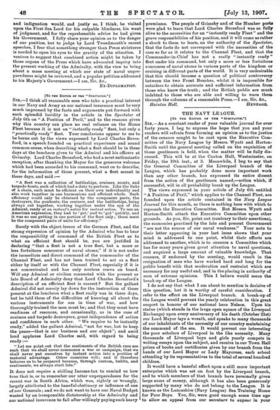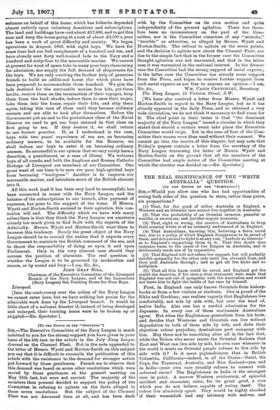THE NAVY LEAGUE.
[To TOE EDITOR OP TRS SPECTATOR:1 SIR,—As a constant reader of your valuable journal for over forty years, I beg to express the hope that you and your readers will refrain from forming an opinion as to the justice of the censure sought to be cast upon the Executive Com- mittee of the Navy League by Messrs. Wyatt and Horton- Smith until the general meeting called on the requisition of those gentlemen is held, when the matter will be fully dis- cussed. This will be at the Caxton Hall, Westminster, on Friday, the 19th inst., at 3. Meanwhile, I beg to say that the General Committee of the Liverpool branch of the League, which has probably done more important work than any other branch, has expressed its entire dissent from the action of the gentlemen named,—action which, if successful, will in all probability break up the League.
The views expressed in your article of July 6th entitled "A Position of Peril," which applies to the Channel Fleet, are founded upon the article contained in the Navy League Journal for this month, so there is nothing here with which to reproach the Executive Committee. But Messrs. Wyatt and Horton-Smith attack the Executive Committee upon other grounds. As you, Sir, point out (contrary to their assertions), the economies practised by the late and present Government " are not the source of our naval weakness." Your note to their letter appearing in your last issue shows that your mind is addressed to one point, whilst their efforts are addressed to another, which is to censure a Committee which has for many years given great attention to naval questions, and acquired a large amount of valuable knowledge. That censure, if endorsed by the meeting, would result in the resignation of men who have worked hard and long for the public benefit with that moderation and restraint which are necessary for any useful end, and in the placing in authority of risen of extreme opinions. This I believe would mean the break-up of the League.
I do not say that what I am about to mention is decisive of this question, but it is worthy of careful consideration. I refer to the effect on the Liverpool branch. A break-up of the League would prevent the yearly celebration in this great seaport in honour of our national hero Nelson. Upon his statue (which stands in the large open square of the Liverpool Exchange) upon every anniversary of his death (October 21st) our Lord Mayor lays a wreath, and speaks to many thousands of our inhabitants of the necessity of our country maintaining the command of the sea. It would prevent our interesting the poor scholars of Liverpool in the like necessity. Many thousands of Liverpool boys and girls yearly compete in writing essays upon the subject, and receive in our Town Hall prizes of books and certificates given by our branch from the hands of our Lord Mayor or Lady Mayoress, each school attending by its representatives to the total of several hundred children.
It would have a baneful effect upon a still more important enterprise which was set on foot by the Liverpool branch, and to which members of that branch have personally given large sums of money, although it has also been generously supported by many who do not belong to the League. It is known as the Lancashire (Navy League) Sea Training Home for Poor Boys. You, Sir, were good enough some time ago to allow an appeal from our secretary to appear in your columns on behalf of this home, which has hitherto depended almost entirely upon voluntary donations and subscriptions. The land and buildings have cost about £17,000, and to get this sum and keep the home going at a cost of about £3,500 a year has been a work of great difficulty and anxiety. We began operations in August, 1903, with eight boys. We have for some time had our full complement of a hundred and ten, and have already sent forty well-trained lads to the Navy and a hundred and sixty-four to the mercantile marine. We cannot at present for want of space take in many poor boys clamouring for admission, nor supply the full demand of shipowners for the boys. We are only awaiting the further help of generous friends to build an additional house (for which plans have been prepared) to accommodate three hundred. We give the lads destined for the mercantile marine free kits, get them berths, receive them on the termination of their voyages, keep them from the land sharks, induce them to save their wages, take them into the home, repair their kits, and ship them again, taking this care of them until they become ordinary seamen and are able to look after themselves. Before the Government put an end to the probationer class of the Naval Reserve we used to get our boys entered in that class on first going to sea. If they restore it, we shall return to our former practice. If, as I understand is the case, boys with two years' experience of sea are, on becoming ordinary seamen, to be available for the Reserve, we shall induce our boys to enter it on becoming ordinary seamen. So successful is our system that we very rarely have a desertion, a punishment, or a case of illness. We welcome boys of all creeds, and both the Anglican and Roman Catholic Bishops of Liverpool are members of our Committee. One great want of our time is to save our poor high-spirited boys from becoming " hooligans." Another is to improve our mercantile marine, and introduce more of the British element into it.
All this work (and it has been very hard to accomplish) has been connected in name with the Navy League, and the balance of the subscriptions to our branch, after payment of expenses, has gone to the support of the home. If Messrs. Wyatt and Horton-Smith succeed in their agitation, this con- nexion will end. The difficulty which we have with many subscribers is that they think the Navy League are amateurs already too much given to find fault with the experts of the Admiralty. Messrs. Wyatt and Horton-Smith want them to increase this tendency. Surely the great object of the Navy League should be to remind the nation that it expects every Government to maintain the British command of the sea, and to throw the responsibility of doing so upon it and upon Parliament. Only in the very clearest case should they assume the position of alarmists. The real question is whether the League is to be governed by moderation and reason, or by sound and fury.—I am, Sir, &c., JOHN GRAY HILL,
Chairman of the Executive Committee of the Liverpool Branch of the Navy League, and of the Lancashire
(Navy League) Sea Training Home for Poor Boys.
Liverpool.
[Into the controversy over the action of the Navy League we cannot enter here, but we have nothing but praise for the admirable work done by the Liverpool branch. It would be little short of a national disaster if, instead of being developed and enlarged, their training home were to be broken up or crippled.—ED. Spectaiorl







































 Previous page
Previous page